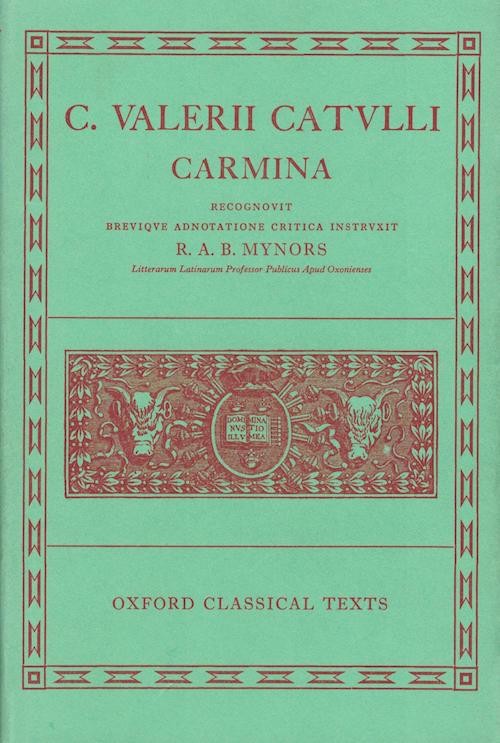
I like how poetry comes over the transom—that’s how it happens to me, and I imagine it’s not dissimilar for a lot of people. You happen to see a poem in a magazine or you happen to see someone speaking about poetry. Poetry exists? Beyond the world of poets? Yes! As Frank O’Hara put it, “you read for some mysterious reason / I read simply because I am a writer.” But people do read for some mysterious reason, and poetry happens even more mysteriously.
I have been surprised at this late date to be given fresh evidence that reading poetry is a kind of mental exercise that has commonalities across millennia and disparate cultures. So, I’m reading Catullus in Latin with my son, Oliver, breaking down the sentences to figure out which nouns in the accusative are direct objects and which are objects of prepositions. Then we look at the verbs, to determine which govern main clauses and which govern subordinate clauses. A helpful approach there is to determine which verbs are indicative and which subjunctive, as the subjunctive verbs are usually (though not always) in the subordinate clauses.
Catullus in particular remains exciting, partially, I think, because his style and language have a colloquial ring to them. His poetry meets the reader halfway, there’s a kind of conspiratorial tone to his poetry, even when he’s not literally pleading for sympathy. In his fourth poem, a boat is speaking—or rather, a model of a boat—and the reader is to imagine the poem as a plaque installed by the poet after his return to Italy from Bithynia (modern-day Turkey, near Istanbul):
That barque you see, my guests,
declares it was fastest of ships,
the velocity of no other swimming timber
could surpass it, whether its force
by oars or by sail was flying.
(from Catullus 4, trans. V. Katz)
Then, I happened to be reading another poet, whose Collected Poems Oliver had picked off a summer reading list, Wallace Stevens. I hadn’t read Stevens since I was in high school. At that time, he affected me greatly, but I thought I’d “moved on.” Reading him again, I became re-enamored of his tough word choices and impermeability to synopsis. And I found myself doing the same kind of reading as I had in Catullus, finding which subordinate clauses went with which main clauses, which nouns were objects, which were subjects. Often, as in Latin, the main verb is held back, and one must wait for the gist of the music:
In verses wild with motion, full of din,
Loudened by cries, by clashes, quick and sure
As the deadly thought of men accomplishing
Their curious fates in war, come, celebrate
The faith of forty, ward of Cupido.
(from “Le Monocle de Mon Oncle”)
And what came, what comes, to me is that the reading of poetry is not like the reading of any other kind of writing. It is its own province; it provides its own pleasures, that come from its own twists and possibilities, its difficulties. Its rewards are all its own.
Vincent Katz is a poet, translator, curator, and critic. He earned his BA from the University of Chicago...
Read Full Biography


